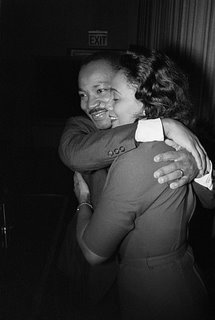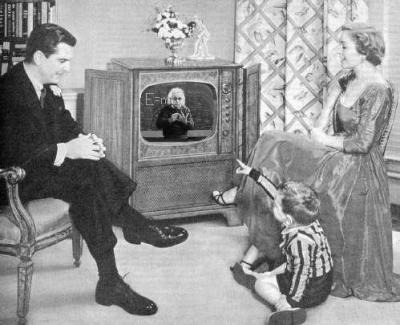"When I say I was married to the cause, I was married to my husband whom I loved -- I learned to love, it wasn't love at first sight -- but I also became married to the cause. It was my cause, and that's the way I felt about it. So when my husband was no longer there, then I could continue in that cause, and I prayed that God would give me the direction for my life....But then I finally determined that it was the King Center, because Martin's message and his meaning were so powerful....So I felt that my role, then, was to develop an institution, to institutionalize his philosophy, his principles of nonviolence and his methodology of social change, and that's what I have spent my years doing."
-- Coretta Scott King
I had this friend in high school, we'll call her Mindy. I doubt she reads or even knows of this blog, but I don't want to embarrass her in any event, so Mindy she shall be called. Anyway, Mindy was absolutely and wholeheartedly in love with global missions. She knew, in her heart of hearts, that she was bound for the mission field. And she knew this because every time a chapel speaker from another country would come through our school, her heart ached. It was practically the only thing we ever talked about, because I sometimes felt the same way, and we both liked talking to someone who didn't care about the practical, pragmatic or sensible thing to do after high school. We were romantics about the thing. And the world needed saving.
Mindy and I were never anything more than friends. We just shared a love for the Gospel. The last time I saw her was the summer of 2000, two years after graduation. She had married the year before, to another high school friend of mine, who was studying medicine. Mindy had known all along that he wasn't ready for life in the mission field, but she loved him, and that was that. She was married to someone who didn't share her passions, and as long as he loved her, it didn't matter, I guess.
Going to a solidly evangelical college, I made more friends like this, young men and women with a passion for local ministry or foreign missions, who found mates that didn't exactly share their hearts. In most cases, it's not so much a big deal. You move past it. Maybe you're not Rick and Kay Warren, but you can still minister. Yet like Mindy, a few of my friends found mates who weren't ready for the mission field, either. And their dreams had to change. I don't know how it works, this whole bit about dreams evolving. It doesn't seem like a very satisfying experience. But most of them seem happy, so who am I to say otherwise?
Coretta Scott's dreams didn't change so much after marrying her husband. She was passionate about social justice long before she met Dr. King. Growing up in rural Alabama, her mother made sure that her children made it through school, sometimes renting a bus and driving her kids and the neighbor children into town for classes. When Coretta went away to college, her intentions were to teach, but her local community didn't allow for black teachers, so she ended up studying music in Boston instead, where she met Dr. King.
Historian Clayborne Carson, Director of the Martin Luther King Papers Project at Stanford University, spoke today on NPR. A long-time friend of Coretta, he said of the couple, "It was clear that there was a meeting of minds -- they were not only deeply in love with each other, but they had a passionate commitment to peace and social justice, which was very striking even in the days when they were dating." After her husband's death, Coretta Scott emerged as a leader in the Civil Rights movement (a process which had begun long before her husband's death), continuing his work for nonviolent resistance and civil rights -- her life's work culminating in the creation of the Martin Luther King, Jr. Center for Nonviolent Social Change, a training center where young people could learn Dr. King's philosophies.
Coretta Scott didn't simply continue her husband's work because it was her husband's work -- it was her business, her cause, too. I'm not saying I know how this works -- finding a mate that shares your deepest passions. I'm not saying it even works at all. But it sure seemed to work for Coretta and Martin.
Spending the day with the radio on, I've learned more about Coretta Scott King this afternoon than in the past 25 years. And because my job entails a lot of standing around, I've had a lot of time (probably more time than was healthy) to think about her story. And this is what I've come up with: I don't want to settle for anything less than Coretta Scott did.
I'm not asking to marry the next human rights leader of the Western world. I just want to find someone who's passionate for life, someone who loves people and hates injustice, someone who's a complete and total geek for experiencing new things, learning new ideas and discovering new worlds. Someone who weeps for the widows and refuses to turn a blind eye when the time for weeping is through. Someone who loves children and isn't afraid of calloused hands. And someone who's funny as hell. Someone who knows that baking is more important than the finished cake. Someone who cares about tradition and change, who's strong-willed as all get out and not afraid to call me a motherfucker when I'm wrong. Or whatever it is they prefer. I'm not a stickler for the actual MF-word.
I just want someone who shares my passions, you know? And if Coretta Scott wouldn't settle for anything less, then why should I?
Tuesday, January 31, 2006
Oh hey, I was just wondering if my future wife was studying music at the Boston music conservatory, too.
Posted by
jonny
at
9:55 PM
2
comments
![]()
Subscribe to:
Comments (Atom)



